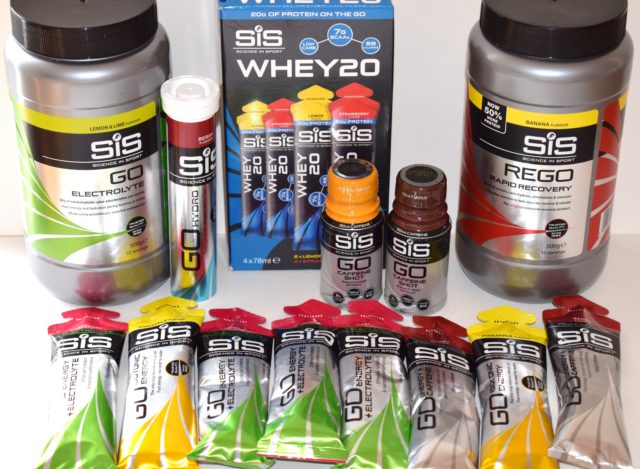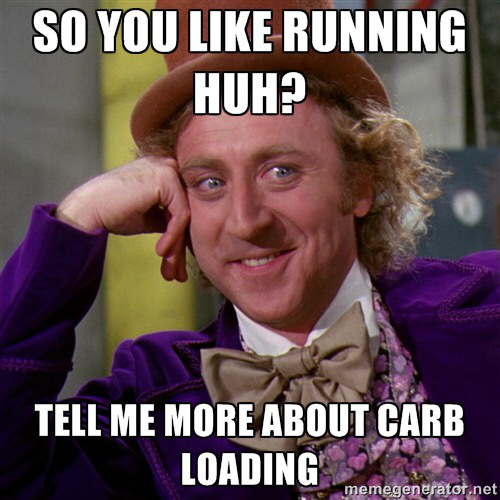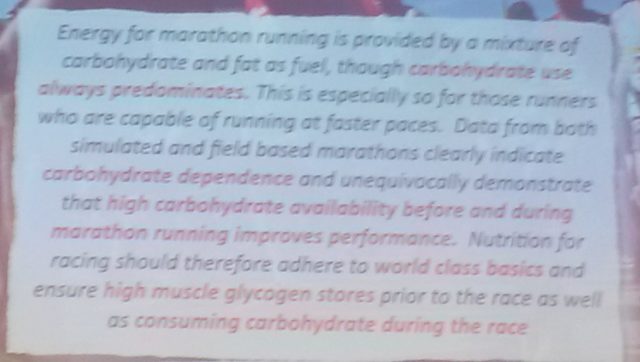We all know good nutrition is essential to performance. With this in mind, I was lucky enough to be invited to an event hosted by Science in Sport (SiS) on nutrition and fuelling for marathon day. In return, I was asked to write this post. I also wanted to share some of the key takeaway messages.

The afternoon included a number of presentations and a run.
Presenters included
- Dr James Morton – SiS Knowledge Director, expert on sport and exercise metabolism and academic at Liverpool John Moores University, also nutritionist for Team Sky
- Alan Murchison – SiS Ambassador and owner of Performance Chef which offers bespoke nutrition, optimised diet & periodised food plans
- Max Willcocks – SiS Ambassador, Coach and ultra trail runner
Go check them out – an impressive cast!
And on the run, well…ermm…I was the slowbie way at the back.
So, here we go … first things first
In everything I heard at the session – carb is King. There, I said it!
These days anything said on nutrition and diet is controversial. I’ve never tried Paleo or high protein/high fat diet or veganism or fruitarianism or been on a raw food diet or tried clean eating (whatever that is). I’m pescatarian, so vegetarian with some fish thrown in, mainly because eating meat makes me feel blergh. All I can say is this is what works for me!
You need to work out what works best for you for everyday nutrition and for training and racing. No one size fits all.
And the second point
If you’re running a half, a marathon, or for longer, your fuelling and hydration strategy is critical – practise, practise, practise – you don’t want to be paying the price on the big day.
Key lessons
Everyday Nutrition
- Eat real food – it will always make you feel fuller for longer
- Eat optimally – this means eating real food and adapting the amount and type depending on training requirements i.e. what you eat after a 5 mile run is not the same as after a 15 mile run
Pre-long runs and race
- Consuming the right amount of carbs is critical to performance
- You don’t need a week to carb load, you can do over 24 to 36 hours
- Focus on high GI foods – bread, pasta, rice
- Eat 3 to 4 hours pre-long runs and race
Marathon Day Nutrition
- Eat 3 to 4 hours before the start
- First fuelling within 30 mins of starting
- Should be aiming for 60g carbs per hour
- Hydration is essential but don’t overdo it – drink to thirst and know your strategy
- If using products with caffeine, it takes about 30 mins to kick in
Recovery after long runs and on the day
- First 4 hours is critical to recovery, esp first 30 mins, and then the next 1 ½ hours
- Aim for 1.2g/kg of body weight of carbs – high GI foods are best here
- Eating optimally – 2 eggs on toast is not enough after long runs or the marathon
- Try to get some fructose (in sucrose) – a fruit smoothie would hit the bill
- Remember protein – it helps support insulin requirements
And eating an optimal diet is a choice so don’t see it as a sacrifice. After all, you chose to run!
Find out what I put into practice here.
What works for you?
With thanks to SiS, a great afternoon! And love the goodie bag!

